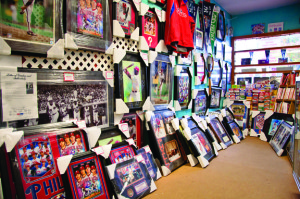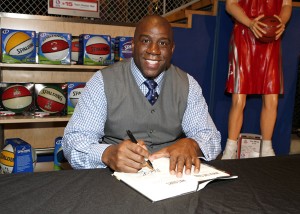 Sellers of phony baloney sports memorabilia are tainting the billion-dollar-a-year sports industry. Scammers prey on individuals who love sports and are willing to lay down cash for purchases that reflect their fanaticism; their commitment to a team or favorite player.
Sellers of phony baloney sports memorabilia are tainting the billion-dollar-a-year sports industry. Scammers prey on individuals who love sports and are willing to lay down cash for purchases that reflect their fanaticism; their commitment to a team or favorite player.
Fearing that a rare, autographed item at the “right” price will get away, a frenzied fan often exits an auction with what he believes to be a little piece of history. However, instead of being signed by his favorite sports figure, what he has actually purchased is a replica of the real thing. Without proper authentication, an autograph is basically only worth the material on which it was signed. Fans should not allow their enthusiasm for the game to overshadow their ability to think straight.
Uncontrollable buying impulses feed right into the unscrupulous practices of dishonest vendors. It is difficult for the average fan to determine the difference between authentic and corrupt vendors and the paraphernalia they sell. But it is possible.
In a 2010 Forbes.com article entitled, “The Fragility of the Sports Memorabilia Industry,” writer Wayne G. McDonnell Jr. called Steiner Sports “one of the safest programs in the sports memorabilia industry.” [1] Steiner Sports leads the way in sports memorabilia marketing and authentication and is the top producer of authentic, hand-signed collectibles.
What this means to collectors is that the Steiner line of memorabilia is guaranteed to be authentic. The company’s motto (“the Steiner seal makes it real”) is key for sports enthusiasts and collectors.
Tips for Finding Real Sports Memorabilia
Accumulating sports memorabilia is an expensive hobby- so expensive that collectors should take great precaution to protect their investment. The following suggestions will help you to avoid memorabilia counterfeiters:
- Educate yourself on the signing habits of your favorite athletes. Some athletes will only sign autographs at organized events. Former New York Yankee Derek Jeter; famed football coach Lou Holtz; and Hockey’s Henrik Lundqvist are a few of Steiner Sports exclusive athletes. If you purchase an autographed ball from a vendor who indicates that he personally secured the signature, aside from an organized event, then you should assume the signature is a fake.
- Avoid impulse purchases. An effective way to keep from buying sports memorabilia on impulse is to place a limit on how much you will spend. Buying a piece on impulse increases the chances of purchasing a “must have“ item that hasn’t been authenticated.
- Don’t be conned into purchasing sports memorabilia that is being sold at a discounted price well below the marketed value. If Michael Jordan’s jersey is being sold for less than you ever imagined possible, then you are probably in the presence of a con man. It is too good to be true, so skip it.
- Purchase memorabilia from authorized dealers (like Steiner Sports) who stand behind their products and provide an authenticity guarantee. Major League Baseball and the National Football League have very strict authentication guidelines. Purchasing from either is a safe bet.
 Attend events where athletes make personal appearances. Obviously if you are present when your sports memorabilia is signed, then you are assured of its authenticity.
Attend events where athletes make personal appearances. Obviously if you are present when your sports memorabilia is signed, then you are assured of its authenticity.
- Do not purchase sports memorabilia from vendors that refuse to reveal information about their company. Assume that the lack of evidence reveals deception. A company refusing to provide background information; such as telephone, mailing address, and email address; might be hiding something.
- It may seem contradictory, but in rare cases, an authenticity guarantee is not enough proof that your memorabilia is real. Be particularly careful in the instance of second party dealers. The certificate of authenticity should bear the signature of both dealers. If the original dealer signs the certificate and the second dealer cannot authenticate, then contact the first dealer before agreeing to purchase the memorabilia.
- Determine if dealers use witnesses to authenticate memorabilia. A witness to the process and the athlete that signed the product are both proof of authentication.
- Purchase from dealers who offer a signed affidavit as proof of authentication. The affidavit will include the signature of the athlete as well as that of a company representative. The document should include a definition of the item that was signed by the athlete and the date and time that the item was signed. Additionally, the affidavit should be notarized.
- Study the market. Athletes may sign particular items over others. For instance, your favorite baseball player may primarily sign baseballs rather than jerseys or caps. Knowing this will help you to avoid purchasing forgeries. Also, keep in mind that back in the old days, sporting goods companies manufactured equipment that bore a copy of an athlete’s signature. It wasn’t intended as an authenticated item. Beware of crooked dealers who pass them off as autographed sports memorabilia.
Do Your Due Diligence and Don’t Get Conned
Sources in a 2000 Federal Bureau of Investigation sting reported that the majority of vintage memorabilia is made up of forgeries.[2] In the 15 years since, progress has been made in cleaning up the industry. However, forgeries are still out there, as proven by a sting where millions of dollars in fake memorabilia was seized prior to the 2015 Super Bowl.[3]
Collectors should also defend the industry by reporting unscrupulous dealers. In the end, collectors should just be proactive in protecting themselves against the illegal practices of crooked dealers who are bilking consumers.
[2] http://www.fbi.gov/sandiego/about-us/history/operation-bullpen


That’s quite attention-grabbing, You are a quite expert blog writer. I have registered a person’s nourish and sit up regarding inside quest of extra of your magnificent submit.. yoga kovrik On top of that, We have embraced your blog during my social networking sites
Hey, i think the most memorabilia for NBA is the hall of fame of NBA. Inside that – the most powerful and perfect sportsman’s of all years, that is really nice strategy from NBA.
http://www.jeffbullas.com/2015/09/10/5-practical-ways-increase-conversions-website/
I’ve never understood why someone would buy an autograph. Isn’t the purpose of the autograph to prove that you indeed met the signer? I have many autographed items in my collection, all of which I personally got signed. That’s the whole point. If I buy a signed piece of memorabilia, whether it is fake or real, I didn’t meet the person who signed it. So what difference does it make?
Outstanding post.
In 2023 with Octopus CRM LinkedIn auto connect tool https://octopuscrm.io/linkedin-auto-connect/ you can send personalized connection requests on LinkedIn in bulk and grow your network fast. And another big plus is that the service keeps up to date with LinkedIn’s rule updates and provides security settings that help users avoid blocking and account problems with auto connect. This includes limiting the number of connections per day and controlling the speed at which requests are sent.